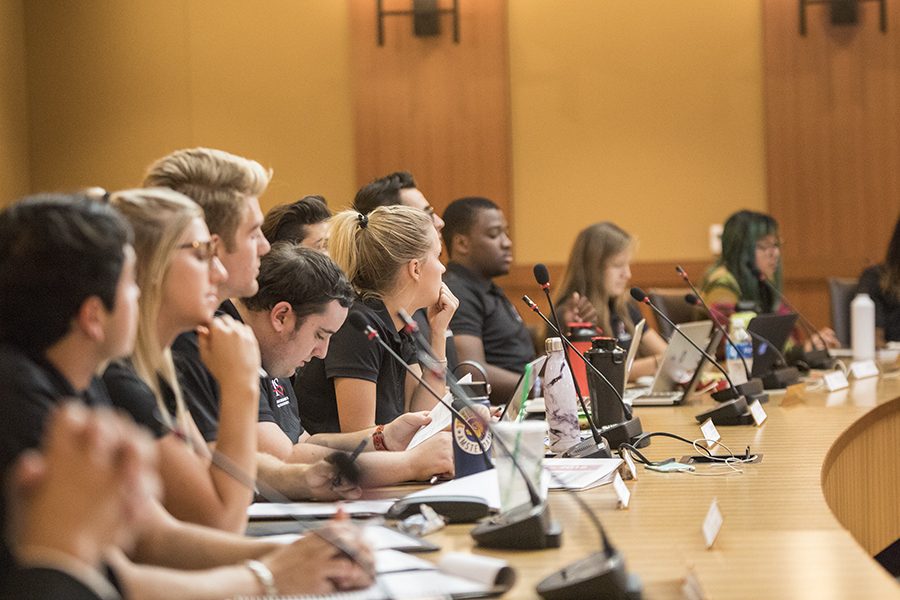A.S. University Council assembled on Nov. 1 for its bi-weekly meeting to discuss concerns of sexual assault.
Sam Martinez, a health educator at SDSU, partnered with A.S. Board of Directors member Michelle Sabin and College of Science representative Emily Jachec to provide an educational sexual assault training to define the topic and methods of support for victims.
“This is an issue that affects everybody and affects them differently,” Jachec said.
Sexual assault statistics
According to the data presented, false reports of sexual assault are very rare — more than 96 percent of those claiming sexual assault are telling the truth, and the victim knew the assailant more than 90 percent of the time.
Martinez said almost all sexual assault cases investigated at SDSU involve alcohol in one way or another, though the statistics on this dated back to 2008.
She also said it’s important to note that 68 percent of rapes occur between the times of 6 p.m. to 8 a.m.
Asking consent
Martinez began an open discussion of how consent should be asked in sexual encounters. A.S. members responded with verbal questions as examples of consent.
Consent needs to be a verbal question that’s asked, and talking — not just texting — needs to take place during sexual encounters, she said.
Carmel Alon, vice president of external relations said consent is not just a male responsibility, and both involved should be obligated to ask for consent.
“A lot of times in this culture, it’s put on the male to ask for consent when it’s really on both parties,” Alon said. “Girls should ask for consent just as much as the guy. I think a lot of times the pressure is on the guy when really, it goes both ways.”
Generally, the person who is initiating should generally be the person who is asking, but all parties must be talking, Martinez said.
However, a person cannot give consent if they are under the influence of drugs or alcohol, she said.
Martinez said when it comes to alcohol, there is no set number of drinks to get intoxicated to incapacitation. Legally, a person cannot give consent under the influence of drugs or alcohol, she said.
“It’s not after one or five drinks, it comes to the way someone is displaying themselves (lack of eye contact, slurred speech, staggering),” she said. “A person could say yes to a sexual act, but if they are to the point of incapacitation, they cannot legally give consent.”
Responding to sexual violence survivors
Jachec said responses to sexual violence vary from person to person.
“It’s incredibly important that if a survivor doesn’t have an extreme response to their assault, this does not mean that their abuse wasn’t traumatizing,” Jachec said. “There’s no such thing as a perfect victim or a correct way to respond to an assault.”
Jachec said the best way to react to a disclosure is by listening, believing and being supportive of their decision. Fewer than 3 percent of sexual violence reports are false, she said.
“From personal experience, these three steps are so important,” Jachec said. “Just the sentence ‘I believe you’ means so much, especially after all that is happening.”
Martinez compared the experience of sexual assault to other traumatic experiences, like car crashes or death of a family member. There is no perfect way to respond, she said.
Resources
There are numerous on-campus resources provided by SDSU that can help assist students affected by sexual violence.
Student Health Services, located in the Calpulli Center, can provide students with STI testing, pregnancy testing and additional services to help accommodate sexual violence victims, Martinez said.
SHS must file a report to the police when notified about sexual violence involving a student, but moving forward to an investigation is the student’s choice.
The San Diego State University Police Department, located next to Peterson Gym, provides assistance in investigating and reporting sexual violence. In addition to reporting, they provide rape and sexual assault training workshops, as well as safety escorts.
Counseling and Psychological Services, also located in the Calpulli Center, offers confidential support for students impacted by sexual violence, harassment or other related experiences.
“If people call to create an appointment and mention sexual violence, they automatically get bumped up on the call list,” Martinez said. “They try to see that person as soon as possible, within the day or the next day.”
Center for Student Rights and Responsibilities Director Lee Mintz assist students with investigations or disciplinary charges against the assailant.
Jachec said Mintz can provide remedies and accommodation for Title IX cases, such as moving dorms and switching out of classes no matter what time of year it is.
“Title IX coordinators will speak to the professor and (teaching assistants) for you,” Jachec said. “They do not disclose anything to the professors. They work with them to help each survivor get the education they deserve.”







